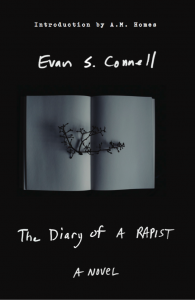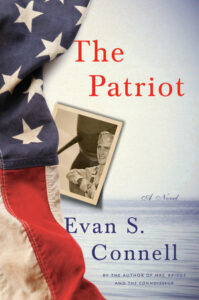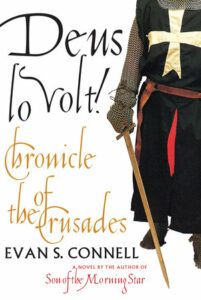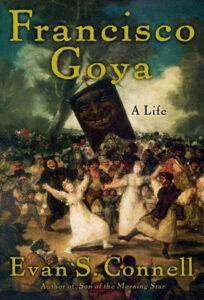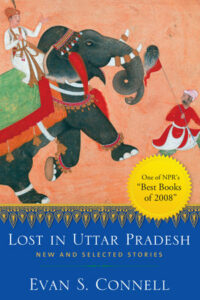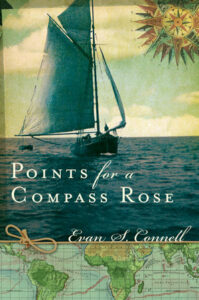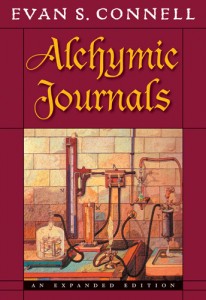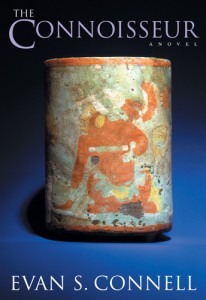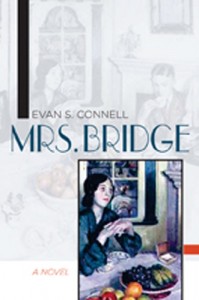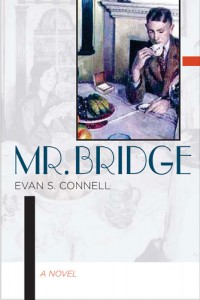Evan S. Connell
Evan S. Connell was the author of eighteen books, including Francisco Goya, Deus Lo Volt!, Mrs. Bridge, and Son of the Morning Star. He received numerous awards, including the Los Angeles Times Book Prize, the Pushcart Prize, a Guggenheim fellowship, and an award in literature from the American Academy and Institute of Arts and Letters. He lived and worked in Santa Fe, New Mexico.
Subscribe to our newsletter for news & events from Counterpoint Press.
Books
The Diary of a Rapist
A Novel
This unnerving work is a contemplation of the middle–class existence in a changing world, narrated by an unstable man held hostage by his deteriorating mental state.The story begins with the unhappy marriage of junior clerk Earl Summerfield to the much older Bianca. Feeling victimized by his cold wife and mocking superiors at work, Earl decides to keep a diary, a chronicle of his apparently crumbling marital relations, the paranoia and abuses he is seemingly forced to tolerate at work, and the world around him going to pieces in 1960's San Francisco. What he sees, what he says, what he wants to say – everything swarms his head and consciousness, inciting and fueling fantasies of love, ambition, and avenging the violent crimes with which he was become obsessed. His angry and unstable mind alternates between feelings of apprehension and disgust, and exploring his own violent, sexual fantasies, and Earl takes action first by breaking into other peoples' houses and then fixating on various women, before settling with utmost and troubling certainty on the local beauty queen, Mara St. John's.
Double Honeymoon
Karl Muhlbach, hero of Evan Connell's previous novel, The Connoisseur, has a new obsession—a beautiful, nubile girl–about–New York named Lambeth Brent, whose puzzling background and swinging activities lead Muhlbach into dark areas, causing new revelations of himself as a man to emerge.The mysterious bonds between opposites come into sharp relief as we follow the course of Muhlbach and Lambeth's relationship. An uncomfortable visit to the ballet, an abortive country vacation, brief but sparkling happy moments, and Muhlbach's final, shocking discovery add up to a mosaic of vignettes, rendering the characters startlingly real.
Double Honeymoon explores the built–in dangers of a love affair between a cautious, conservative, middle–aged widower and a neurotic, high–strung, self–destructive girl. But far from just another May–September romance, the book is a keen examination of the dilemma posed by two people who are attracted to each other, yet unable to come together because of the profound differences in their backgrounds and outlooks. With a sure hand, Evan Connell demonstrates just how profound those differences can be.
The Patriot
A Novel
Another brilliant example of Evan Connell's art, The Patriot deals with an American boy who grew to maturity with World War II. He had learned his father's patriotism, and then, through the impact of firsthand experience, formulated his own.Melvin Isaacs, aged seventeen, became a Navy Air Force cadet in 1942. His course of training as a flyer was an education in fear and death, even though it had its wonderfully comic times and a sense of comradeship that was new to him. Perhaps it was in the air—for Melvin loved to fly—that the first feelings of aloneness stirred his mind. Melvin, who queried the whys and wherefores of his regimented training life, became, despite all efforts to conform, a maverick. This portion of the novel is a touching and true mixture of human comedy and tragedy, and it also embodies scenes of flight and danger that are unmatched for pure vividness and sensate realism.
The story of Melvin after the war is a continuation of the absurdities that can pursue a man so constituted that he must think for himself. And here the implications of the novel become clear. It is partly the age–old story of a father and son in conflict, of an older generation's notions that are insupportable to the younger, a human dilemma that has no possible resolution. It is also the story of Melvin's final rejection of war, of his unshakeable conviction that a man today must think and act for the good of the planet, Stephen Decatur's slogan notwithstanding. With too many excellences to catalogue and extol, the novel has a total effect of a new voice telling a new story of this old familiar world.
Deus Lo Volt!
A Chronicle of the Crusades
God wills it! The year is 1095 and the most prominent leaders of the Christian World are assembled in a meadow in France. Deus lo volt! This cry is taken up, echoes forth, is carried on. The Crusades have started, and wave after wave of Christian pilgrims rush to assault the growing power of Muslims in the Holy Land. Two centuries long, it will become the defining war of the Western world.Francisco Goya
Life and Times
The author of Son of the Morning Star and Deus Lo Volt probes the mind of the Spanish painter, reconstructing the violent, repressive Spain he called home and charting his powerful influence on Western art.This biography of Francisco Goya breaks the mold--recounting with stunning immediacy the uncommon genius behind the renowned Spanish painter. Darkly brilliant and casually masterful in turn, Francisco Goya changed art forever. During the days of the Spanish Inquisition, Goya painted royalty, street urchins, and demons with the same brush, bringing his own distinctive touch to each. This unusual man and his ghastly times are the perfect subject for Evan S. Connell, one of our greatest and least conventional writers. Introducing a wealth of detail and a cast of comic characters--a motley group of dukes, queens, and artists, as lewd and incorrigible a crew as history has ever produced--Connell has conjured Goya's life with wit, erudition, and a sparkling imagination.
Lost in Uttar Pradesh
New and Selected Stories
Evan S. Connell's restraint, concision, and perfect pitch lend themselves stunningly to the short story form. He intuitively senses when to explain and when to let silence stand in speech's stead. His characters—among them, a wanderer back from Spain, the corpulent Mr. Bemis, Katia and her lion—ring true not because the stories are filled with monumental events, but because they center around seemingly insignificant experiences that remain in the mind, imbued with a meaning ever difficult to define. Often we are left to float in their wake, ending in an ellipsis of sorts. Yet by Connell's mastery, even the voices that speak only once resonate beyond the final page.Points for a Compass Rose
"We have here on the planet with us a man of such courage and strength of spirit that he has not lost what Alfred Adler calls 'the nerve for excellence.' He has kept it despite the burden of an awareness not only of the enormity of his project and of the limitations of his own human understanding, but also of the abject ignorance and indifference of his audience..."Somehow Connell makes you care. Many modern poets demand a good deal of work; Connell excites it. Sometimes the note–taker's [narrator] tone is hectoring, even belligerent; if you have any competitive spirit at all, you seize a thread—any thread—follow it, and lo, it traces a pattern. . . you understand at last that these notes are not tentative explorations, and far less are they 'expression:' they are instead the magnificent artifices of a giant intellect...
"These poems are masterpieces. You could bend a lifetime of energy to their study, and have lived well. The fabric of their meaning is seamless, inexhaustible. . . their language is steely and bladelike; from both of its surfaces flickering lights gleam. Each page sheds insight on every other page; understanding snaps back and forth, tacking like a sloop up the long fjord of mystery."—Annie Dillard, Harper
Alchymic Journals
Capturing the spirit of arcane writing, Evan S. Connell delivers spectacular and esoteric prose as he imagines the journals of seven alchemists. The first is Paracelsus, the famous sixteenth–century alchemist, who is followed by an array of distinct voices: physicians, historians, alchemists, and philosophers. Each employs a unique personality and point of view in a world of pre–scientific thought, of the western world about to step into modernity.Though this historical recreation is medieval in style, Connell succeeds in infusing his diarists with alchemic wisdom, ancient appeal, and felt humanness. A work of rigid art and astute mimicry, Connell's work is intelligent and remarkable, medieval yet applicable to modernity. Alchymic Journals is, at its core, a study of humanity from the mind of one of America's greatest writers.
The Connoisseur
A Novel
Acclaimed author Evan S. Connell sends us through the complete experience of a man initially intrigued and then enslaved by art: a curious interest, a rapt fixation, and the becoming of a connoisseur. The Connoisseur trails the evolution of Muhlbach, an insurance executive on a business trip in Taos, New Mexico, who develops an obsession with pre–Columbian figurines after meandering through a curio shop. Entranced yet bewildered by his sudden affinity for a little figurine, Muhlbach succumbs to his intrigue and, thirty dollars later, begins his journey as a connoisseur.With superb delivery and subtle clarity, Connell allows us to see and feel Muhlbach's emerging mania, with its impending tension and sudden exhilaration. He illustrates how a new fixation alters our lens on life and shapes our actions.
Mrs. Bridge
A Novel
"Again and again. . . I find myself being a Mrs. Bridge evangelist, telling them that it’s a perfect novel, and then pressing copies on them. . . What writing! Economical, piquant, beautiful, true." —Meg Wolitzer, The New York TimesIn Mrs. Bridge, Evan S. Connell, a consummate storyteller, artfully crafts a portrait using the finest of details in everyday events and confrontations. The novel is comprised of vignettes, images, fragments of conversations, events—all building powerfully toward the completed group portrait of a family, closely knit on the surface but deeply divided by loneliness, boredom, misunderstandings, isolation, sexual longing, and terminal isolation. In this special fiftieth anniversary edition, we are reminded once again why Mrs. Bridge has been hailed by readers and critics alike as one of the greatest novels in American literature.
Mr. Bridge
A Novel
The classic novel about a repressed upper–middle–class husband in the American Midwest, by a New York Times bestselling and Man Booker Prize winning author.Walter Bridge is an ambitious Kansas City lawyer who redoubles his efforts and time at the office whenever he senses that his family needs something—even when what they need is more of him and less of his money. Affluence, material assets, and comforts create a cocoon of respectability that cloaks the void within—not the skeleton in the closet but a black hole swallowing the whole household.
Together with its companion, Mrs. Bridge, this novel is a classic portrait of a man, a marriage, and the manners and mores of a particular social class in the first half of twentieth–century America.
“A small masterpiece.” —Joyce Carol Oates
“Mr. and Mrs. Bridge are forever human, forever vulnerable, forever pitiable. In spare, whimsical, ironic prose, Connell exposes each and every one of their wrinkles and then, in the end, offers them to us as human beings to be cherished.” —The Washington Post

Catapult | Counterpoint | Soft Skull
20 Jay Street #704
Brooklyn, NY 11201
646.926.0805 | contact@catapult.co





